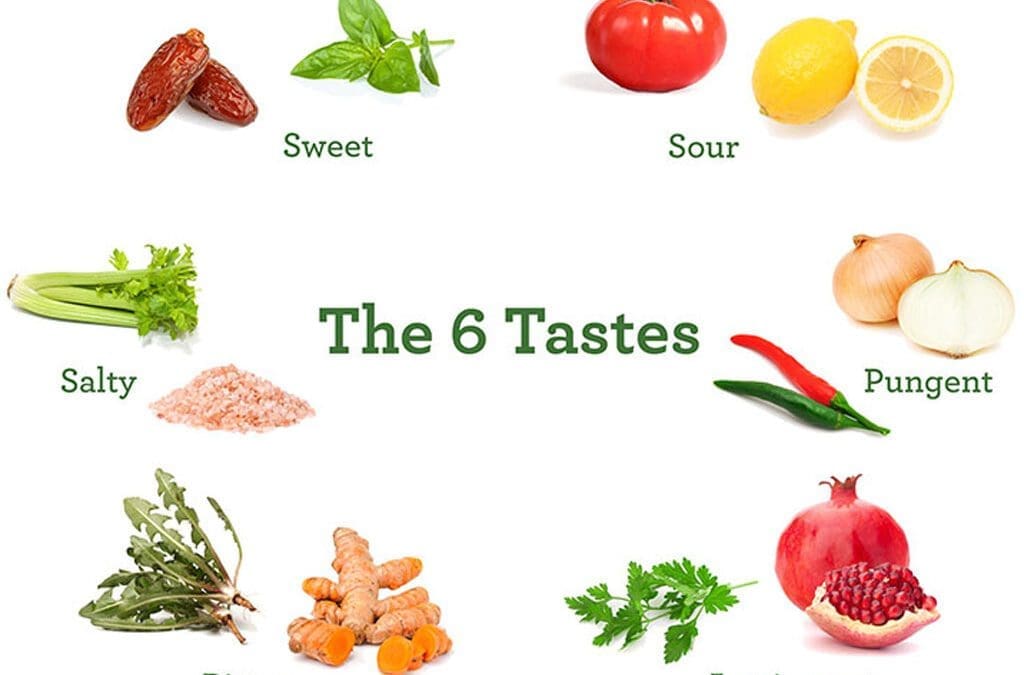Munkudil is one of the Wellness retreat in Kerala and also the best wellness resort in Kerala helps to understand the six tastes of Ayurveda.
- six tastes are identified as sweet, sour, salty, astringent, bitter and pungent. Each taste has the power to either balance or aggravates our body-mind constitutions/ Three Doshas, Vata, Pitta and Kapha.
2. Each taste has different properties, and they can be used as a medicine if used with an understanding of the individual constitution and imbalance (prakruti/vikruti).
3. As the Ayurvedic principle of healing is applied according to which “like increase like” and “opposite decreases each other”, we can understand how the various tastes affect each “dosha” and therefore the body and mind.
4. Health and longevity can be achieved by knowing and properly dealing the characteristics of the six tastes and the current state of the body
Understanding the Six Tastes
Food is the basis of human existence. Mother Nature has prepared the food for us before we are born, such as vegetables, leafy vegetables, fruits, legumes, nuts…etc
There are “six types of tastes” that can be tasted on the tongue with a variety of flavors, colors and aromas to satisfy the hunger and appetite of human beings. The most important of these is the taste in the mouth when eating.
Ayurveda sees Taste or Rasa, as a tremendously powerful therapeutic tool and recognizes each of the six tastes, has a vital role to play in our physiology, health, and wellbeing
Taste is assigned to have a much deeper significance in traditional Indian healing systems than accustomed to in the West; it is considered critically important in determining the effect that various foods, spices, therapeutic herbs, and effects have on our state of balance—body, mind, and spirit.
Culinary emperors in many lands cook for them, noses, eyes, and tongues in mind. But the first thing to think about is the positive change that comes to your mind through food and six tastes in it.
According to Ayurveda, six tastes must be included in our diet to maintain health and to live disease free. Six tastes are identified as sweet, sour, salty, astringent, bitter and pungent.
The six tastes are derived from the “five fundamental elements i.e. Earth, Water, Fire, Space and Air”.
As each taste has different properties, they can be used as a medicine if used with an understanding of the individual constitution and imbalance (prakruti/vikruti).
Western diet has become focussed on mainly three tastes only, which are sweet, sour and salty. So there is a lack of satisfaction of the senses and nourishment of the tissues in their diet plan. Each taste has the power to either balances or aggravates our body-mind constitutions/ Three Doshas, Vata, Pitta and Kapha.
Taste 01. SWEET
The sweet taste is formed predominantly by earth and water elements. It is nourishing, strengthening, and grounding. It is good for the complexion, hairs and it prolongs life and increase Ojas (immunity).
BUT in excess, the sweet taste is congesting, suppresses appetite, creates obesity, diabetes and promotes laziness. The sweet taste therefore naturally balances Vata dosha which is formed predominantly by the air and space elements and pitta dosha formed by water and fire elements. It increases kapha dosha which has similar elements as the sweet taste as it is also formed predominantly by water and earth elements.
Normally joy comes as soon as we hear the word sweet and as the sweetness touches the tongue, the dryness of the tongue will go away. Sweet taste can reduce the intensity of burning in the tongue due to hot foods.
Sweets can thicken the saliva and nourish the body, by producing more blood, semen, breast milk…etc. Sweets contribute to good glow in the eyes, smoothness to the body and growth in children. Most grain powders are carbohydrates and contain sweetness.
Even babies and adults can’t hate sweets. It is important to know that eating more sweets will make you fattier and lazy. Loss of appetite and exacerbation of sore throat are other effects of overuse of sweetness.
The sweet taste also alleviate depression in the stomach, loss of sensation in the skin, constipation, inflammation of the glands in between the legs, thickening and obstruction of the urinary tract, and disease in the lacrimal gland.
Sweeteners reduce blood flow by thickening the blood vessels. So it is important to know that we can live a healthy life only if you keep a good distance with sweets.
Taste 02: SOUR
The sour taste stimulates (Agni) appetite, energizes the body and mind, and is good for the heart. It can cause acidity, produce burning sensations, blindness, and looseness of the body and be toxic for the blood. It balances vata dosha and increase kapha and pitta doshas.
By the time we start to think about sour taste food, saliva will start dripping on your tongue. Sour is one of the two main flavours of food. It helps the digestion process. Sour tastes also enhance color, clarity, and vibrancy in the mind and strengthen to the heart.
Excessive use of sour food can cause tooth decay, narrowing of the eyes, narrowing of the hair, increased bile, heartburn, increased appetite, BP, itching, increased swelling of the mouth, sore throat…etc
Taste 03: SALTY
The salty taste is laxative, promotes growth, aids with digestion, lubricates and removes rigidity. In excess it will create heat in the body, baldness, premature greying of hair, wrinkles and water retention. It balances vata dosha and increases kapha and pitta doshas.
Some accuse salt as white poison, which is not true. No matter how good, unsalted food should be thrown away. Salt causes saliva to pass through the tongue, causing appetite and pressing down on previously eaten food. Salt also helps in dehydration.
But use of excess salt will cause dryness of the tongue, drowsiness, rapid spread of toxins, rapid swelling of the tumors, thinning of the semen, and excessive bleeding during menstruation.
It can also cause pain in the eyes, ears, gray hair, aging, baldness, dandruff, scabies, tongue ulcers, scabies, inflammation, mouth sores, ankle swelling, sourness, heartburn and stomach ulcers.
Taste 04: PUNGENT
The pungent taste stimulates digestion, increases hunger, clears the channels from mucus, cures diseases of the throat, reduces swelling, dilates the channels and therefore aids circulation and elimination of waste products. It balances Kapha dosha and increases Vata and pitta doshas.
Astringent taste is the one that causes hot burning sensation in those who experience it. We cannot say that astringent is not good; it does both good and bad. For those who have low firepower, loss of appetite and anorexia due to fever, this taste will be friendly. Appetite and taste begin to rise and obstacles in the food paths will be removed and move forward with the use of astringent taste food. It also act as an ally in inflammation and fat
Excess usage of astringent taste foods may experience fatigue, drowsiness, dizziness, sore throat, nausea…etc
Taste 05: BITTER
The bitter taste improves detoxification, cures anorexia and worms or bacteria, relieves thirst, reduces fat and relieves inflammation, fever, nausea and burning sensations. It dries up moisture from the body and is cold. Therefore it balances pitta and Kapha doshas and aggravates Vata dosha.
The word bitter, makes most people frown when he/she hears the name. Although not at the forefront of taste, bitterness is always at the forefront of medicinal usage.
Bitter food helps to digest the food eaten. There will be less constipation. Excess fat and fat in the mother’s breast milk and the baby’s indigestion of breast milk will begin to disappear with the advent of bitterness.
There will be decreased salivation in the mouth as well with bitterness. Even though it’s good in many ways, eating more bitter food will create problems like cramps, headaches…etc
Taste 06: ASTRINGENT
The astringent taste is cooling, cleanses the blood, and dries up moisture and fat. It is water absorbent, creates dryness of the mouth, throat and the body resulting in emaciation, loss of virility, bloating, gas and constipation. It balances pitta and kapha doshas and increase vata dosha.
Astringent taste is becoming unfamiliar to modern living. Although rich in medicinal and immune properties, many people do not like this. As soon as this taste touches the tongue, the salivation begins to stop and it has the ability to bind water and blood.
It can cause constipation and has the ability to prevent bleeding in piles and during menstruation. It also has healing properties for cracks and bruises. It’s a remedy for ailments such as scabies and useful in excessive bile and fat related issues. However, over-consumption of this taste can lead to dry mouth, flatulence…etc

